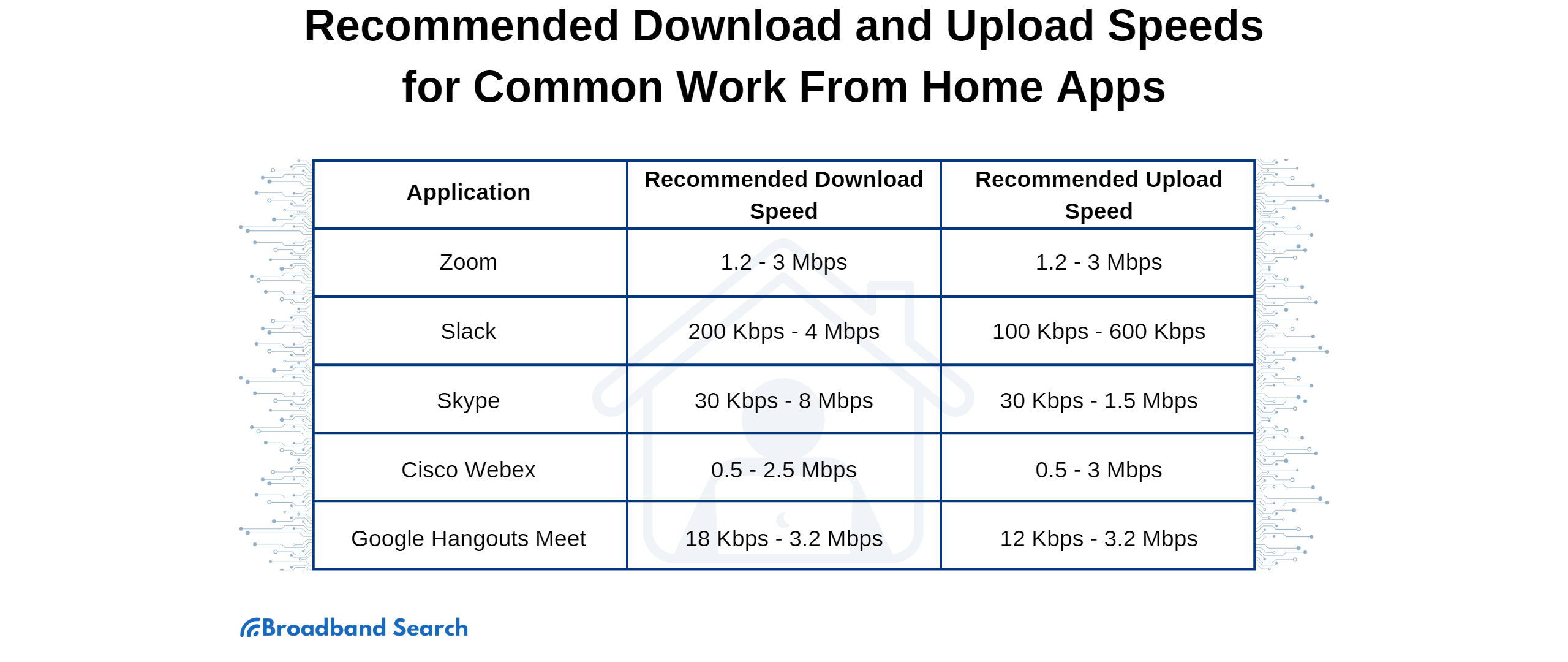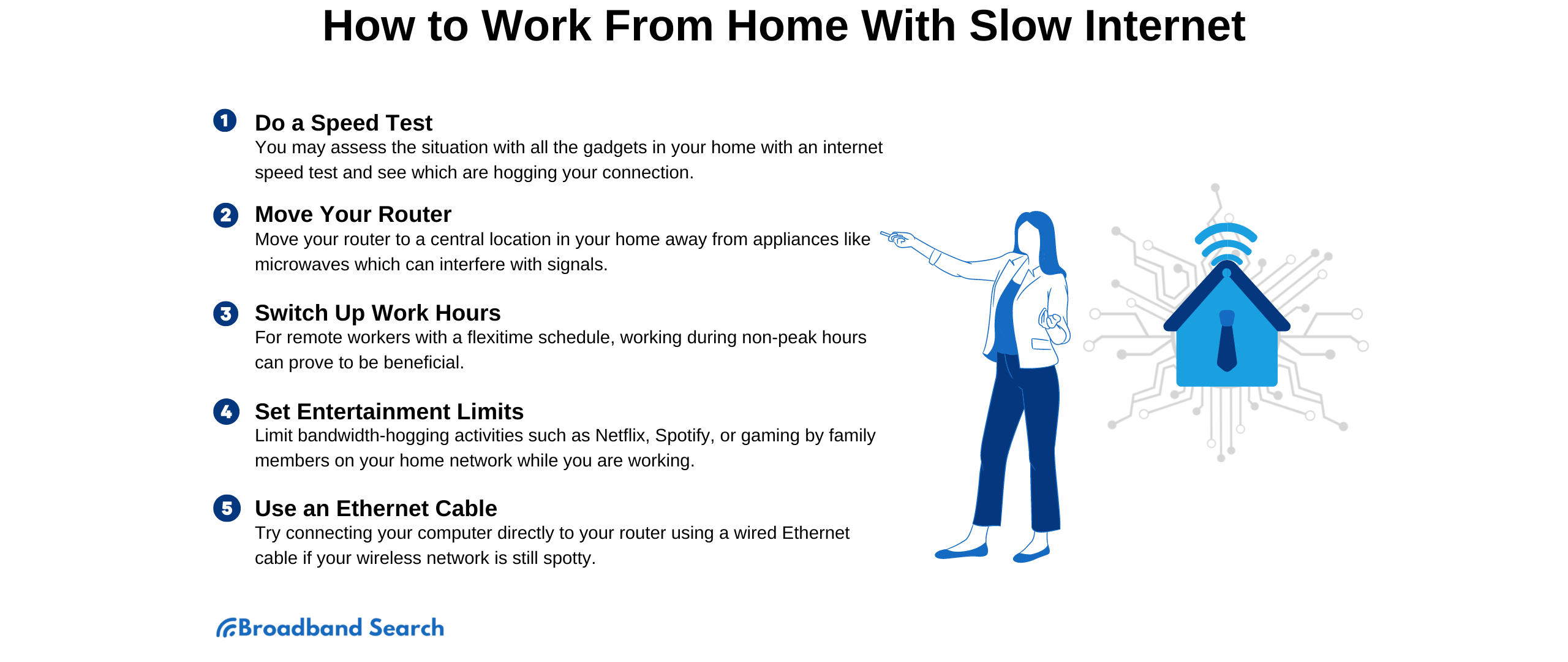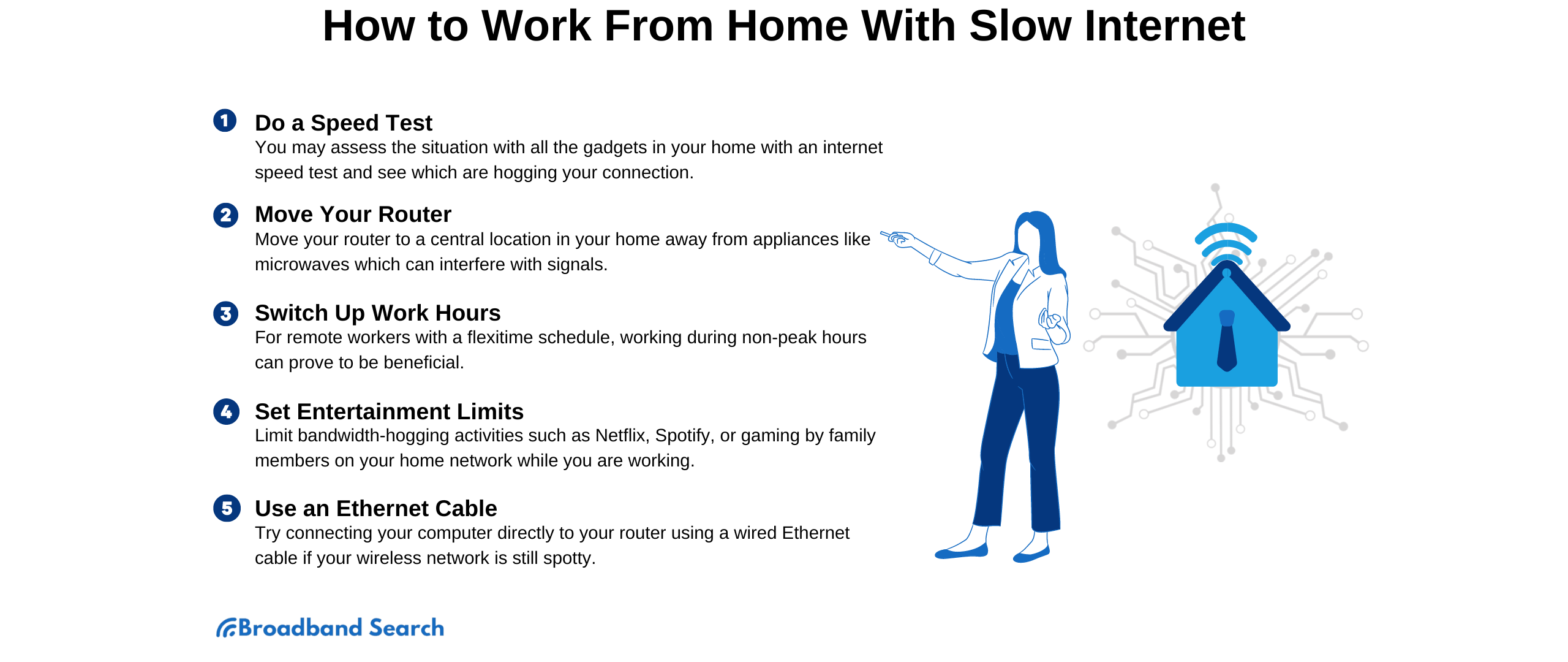The pandemic has increased the number of people that are working remotely all around the world. It’s an extremely convenient type of work, saving companies and individuals time and money. However, although remote work comes with a lot of benefits, there is a need for an internet connection. Many people don’t want to get started with remote work because they’re unsure if their internet is fast enough to handle everything they need to do in their day-to-day jobs.
If you’re one of these people wondering if your internet can handle remote work, you’ve come to the right place! We’re going to go through the speeds you should have for remote work, ways to improve your internet speed, and what types of remote work don’t even need a fast internet connection to be done effectively.
What’s a Good Speed for Remote Work?
When working from home, determining a good internet speed will ultimately depend on what you’ll need to use the internet for. If your job requires you to download and upload large files frequently, you will likely need a download speed of at least 50-100 Mbps and an upload speed of at least 10 Mbps.
While the 10 Mbps upload speed isn’t fantastic for uploading large files, it will still be able to get the job done if you’re the only person working from home. If you are going to be working at home at the same time as other people, of course, you will need higher upload and download speeds according to what everyone needs to use the internet for.

Your download speed, upload speed, and data all play a significant role in your ability to work from home, so it’s essential to understand what each of these things affects.
Download Speed
Download speed is the main thing that most people focus on when getting an internet connection because it plays a part in most of what you need to do. Whether it’s searching the web, downloading files, or even watching videos online, your download speed impacts how quickly and easily you can do these things.
Upload Speed
Most people don’t prioritize upload speed because it doesn’t affect tasks that people do very often. However, you’ll probably need upload speed more than you think when it comes to remote work, making it an essential part of your remote work life. Upload speeds affect things like sending messages or emails, taking part in video calls, or uploading files to the cloud or online workspace.
Data
Your data will impact how much you can do each month online. The more data you have, the more you can do without running out. Most internet service providers give you access to at least 1 TB of data each month, and it’s also becoming more popular for unlimited data to be an option. Suppose you frequently download and upload files or do data-intensive activities online for your work. In that case, you’ll need enough data to do those things. If you don’t have enough, you could have to buy more or experience extremely slow internet speeds due to going over your data cap.
Tips on How to Improve Your Slow Internet When You're Working Remotely
One of the most common issues when working remotely is slow home internet speed and spotty Wi-Fi connection. Below are some things you can do to find out what’s happening and either avoid or fix the issue.

Do a Speed Test
A speed test is a simple test to check what download and upload speeds you’re getting on your internet. It connects your device to a test server to do this and may also give you other information like latency, jitter, etc.
Speed tests are helpful because they give you insight into what’s happening with your internet connection. If you aren’t getting the speeds you’re supposed to be getting, you can try to figure out what’s causing the issue.
Move Your Router
The position of your router can impact the speeds you receive on your devices. If your router is far away, the Wi-Fi signal will weaken, and you won’t get the same speeds as those you’d get when sitting closer to it.
Move your router closer to the devices that you’re going to be using for work. Or move the spot where you work to be in the same room as your router. It can make a big difference and might be all you need to do to get those better speeds you need.
In addition to the distance from your router affecting your signal, other devices can also interfere with it. If devices around your router operate on the same frequency or objects between you and your router, these can impact your signal strength and speed. Move devices that might interfere with the signal, and try to have a direct line of sight between the device you’re working on and the router for the best connection.
Switch Up Work Hours
Internet rush hours are times when many people use the internet simultaneously in the same area. When this happens, more of your ISP’s bandwidth is used up, and everyone will experience slower speeds. If you’re lucky enough to have a flexible schedule, you can try changing up the hours that you do your work to avoid peak hours and get the best possible speeds from your provider. Another idea is to try offline work during peak hours and move to online work when your internet connection can operate at full speed again.
Set Entertainment Limits
How you use the internet can increase internet consumption and reduce speeds for everyone in the house. Using the internet for entertainment purposes - such as streaming videos - can take up a lot of space on your network. If you don’t have the speeds capable of handling entertainment and work, it’s a good idea to set limits for yourself and others in the house during work hours.
Use an Ethernet Cable
You can use an ethernet cable to connect your devices directly to your router or modem. This is much stronger and more reliable than Wi-Fi, which is excellent for working from home. If you’re someone who frequently experiences a spotty connection, it’s a good idea to give this a try. Just keep in mind that the device you’ll be using will also need an ethernet cable port to allow you to use this type of connection.
Kinds of Remote Work That Don’t Need Fast Internet
Not all jobs require a super fast internet connection. If you have one of the jobs that we’ll mention below, you may get by just fine with slower speeds.
Customer Service
Customer service requires you to send messages and make calls when communicating with customers. These activities don’t need high internet speeds to be completed online because they’re not complex or data-heavy tasks. As a result, you’ll be able to get by with a slower connection and may not even notice a difference at all.
Digital Marketing Specialist
You’ll create and analyze marketing programs on different platforms as a digital marketing specialist. Since it doesn’t take high speeds to access this information or do most of the tasks that a digital marketing specialist needs to do, you’ll be able to continue to do your job effectively, even if your connection is a bit slow.
Search Engine Optimization (SEO)
SEO is an excellent option for people with slow internet because a lot of what you do won’t completely rely on the internet - developing an SEO strategy, for example. Of course, there are online tools that you may need to use as part of your job, but most of these also don’t require a fast connection to run well.
Sales
Similar to being in a customer service role, if you’re in sales, a lot of what you do will involve sending emails and making calls. Since these tasks don’t require high internet speeds (e.g., you can send emails with very slow internet), you’ll be able to do your job without any problems.
Content Writing
As a content writer, you’ll be able to write your content locally (i.e., on your device) without any internet connection. When you’re done, you can easily upload that content to the blog you’re writing it for or to whatever platform your client or company uses to get that content from you. Once again, sending written content from one place to another doesn't take a lot, meaning you can easily get your job done and upload your content even when your connection is slower than usual.
The Bottom Line
The world is moving in a new direction, and many more people have started to see the benefits of working remotely. While there are a lot of jobs out there that require you to have a fast internet connection, there are many things that you can do to improve the speeds that you’re used to. There are also a lot of jobs that don’t need much of an internet connection, meaning you won’t need to make any changes whatsoever.
So, if you’re someone who has had your eye on remote work but has been worried about whether or not your internet speed can handle it, try making some of the changes we’ve mentioned, or just consider what you do each day. If you have a job that doesn’t need a fast connection, you may not need to make any changes.
FAQ
Can you work from home on 4G?
4G internet is fast and reliable enough for most people to work from home. As long as you have enough data to do your work and are in an area where the 4G connection is reliable, you should be fine.
Is working remotely unhealthy?
Working from home itself is not unhealthy. It all comes down to your ability to manage your own time and what you do in that time. If you know how to set boundaries with work and leisure, you can live a happy, healthy, and balanced life while working remotely.
Is LTE good enough for home internet?
While LTE is slower than true 4G, it is still a fast connection and can be good enough for home internet, depending on what you need to do online. It’s not as good as fiber optic internet, but it will still help you get a lot done on the internet. Many people use LTE as a temporary option when waiting for other, better types of internet to be installed in their homes.
How much internet speed do I need for Teams?
Teams doesn’t take a lot of bandwidth to run effectively. In fact, Microsoft claims that Teams can deliver HD video quality with only an internet speed of under 1.5 Mbps! This depends on several other factors, but most connections these days should be able to handle Teams.
How many people can use 5 Mbps?
A 5 Mbps line is best used by only one or two people depending on what the line is being used for. If you’re doing more data-heavy tasks (relatively speaking), then it’ll probably only be suitable for one person to use it.

